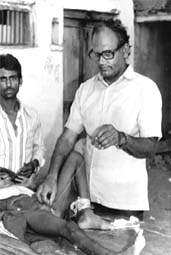Wiped out
 if incidence of cases and reports released by the health ministry are to be believed, then the guinea worm ( Dracunculus medinensis) , a nematode worm which lives under the skin, has been wiped out from India. Not a single case has been reported since 1996 as compared to 40,000 cases reported in 1984 from almost 12,800 villages in Tamil Nadu, Andhra Pradesh, Gujarat, Rajasthan, Madhya Pradesh, Maharashtra and Karnataka.
if incidence of cases and reports released by the health ministry are to be believed, then the guinea worm ( Dracunculus medinensis) , a nematode worm which lives under the skin, has been wiped out from India. Not a single case has been reported since 1996 as compared to 40,000 cases reported in 1984 from almost 12,800 villages in Tamil Nadu, Andhra Pradesh, Gujarat, Rajasthan, Madhya Pradesh, Maharashtra and Karnataka.
However, the World Health Organisation ( who ) is yet to issue a certificate confirming this development. With India moving out of the list of countries affected by the guinea worm, only a few regions around the world have the worm. V Ramalingaswami, National Professor Emeritus asserts: "In India, there has been no infection since 1996. So India is free. There is still some transmission going on in Africa and Yugoslavia, I don't know when it will be eliminated, maybe another two years.'
The disease primarily occurs in rural areas that do not have access to clean drinking water. The worm enters the human body through vectors like water fleas or cyclops. The adult guinea worm is a parasite that grows up to 1.7 metres and the worm has two hosts human beings and fleas. The fleas enter human bodies after consuming guinea worm larvae through an open wound or contaminated drinking water.
The symptoms surface only when the female worm lay eggs, which is usually after a year of entering the human body. The worm surfaces after rupturing the skin usually in the lower limbs and occasionally in other parts of the body, causing severe swelling with an acute burning sensation. This makes the infected person immerse the wound in water to soothe the burn. This sends the larvae back to the water, perpetuating the disease cycle. "The cool water induces the pregnant female worm to eject hundreds of thousands of free-swimming larvae into the water. If the pool contains the intermediate host
Related Content
- What is the Missing Ingredient? The German Agriculture and Food Strategy for Africa 2025
- 2021 Global Hunger Index
- Niger- spring 2021 economic update: maximizing public expenditure efficiency for rebuilding better
- Order of the National Green Tribunal regarding illegal extraction of groundwater for washing silica sand, Shankargarh, Allahabad district, Uttar Pradesh, 16/07/2020
- COVID-19 And Tourism
- World Economic Situation and Prospects as of mid-2020
